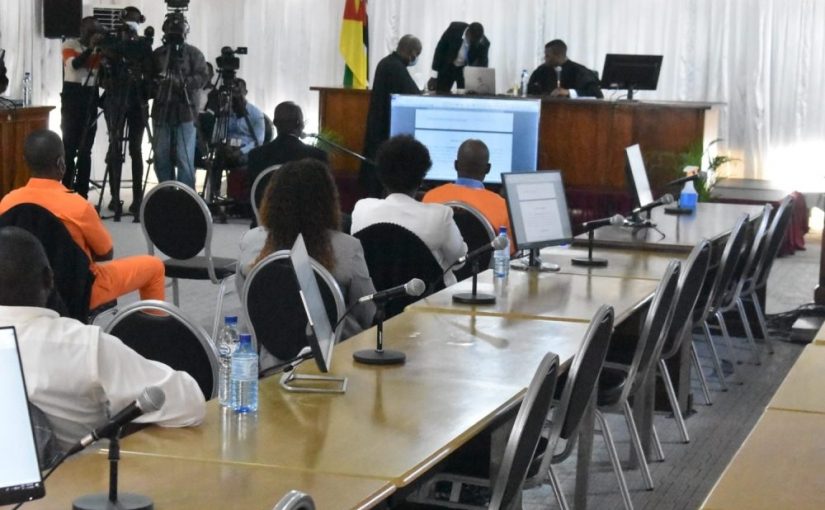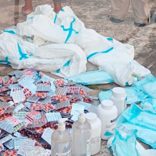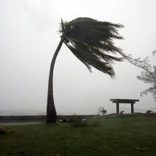Mozambique: Two vehicles set on fire in Maputo after arrests for vandalism
Hidden debts trial: 15 November 2021 – AIM report

Photo: Noticias
The French shipyard Constructions Mechaniques de Normandie (CMN), owned by the Abu Dhabi based group Privinvest, knew that the fishing boats it was building for the Mozambique Tuna Company (Ematum) did not meet Mozambican requirements, yet it failed to correct the defects, according to the former Ematum Director of Operations, Silvestre Soluda.
Testifying on Monday before the Maputo City Court, in the trial of 19 people charged with criminal offences in connection with Ematum and two other fraudulent companies, Proindicus and MAM (Mozambique Asset Management), Soludo said that the maritime regulatory body, INAMAR, was surprised when it found that boats to be used in Mozambican waters were being built in the French port of Cherbourg, without any input from INAMAR.
Soluda, who was formerly the director of the Maputo Fisheries School, paid a visit to the CMN shipyard in December 2013, accompanied by inspectors from the National Fisheries Inspection Institute (INIP). He wanted a team from INAMAR on the trip too but was overruled by Ivone Lichucha, a member of the Ematum board, who said the INAMAR inspection could wait until the boats arrived in Maputo.

Soluda thought this was the wrong procedure since logically the INAMAR inspection, crucial for registering and licensing any fishing boat, should precede the INIP inspection. Since the Ematum project had not been previously submitted to INAMAR, Soludo had to bring all the relevant documentation from France.
He arrived at Cherbourg, just as the first five longliner fishing vessels were being launched into the sea. Contrary to his expectations, he found that the boats were not carrying any fishing gear. Under the turnkey contract Ematum had signed with Privinvest, the boats should have arrived with their gear, and ready to start fishing.
But the boats lacked their long lines, the hooks that should be attached to them and the buoys used to warn other shipping away from the lines. All this Ematum would have to buy from other suppliers.
Soluda had never seen the contract between Ematum and Privinvest, and so it was only when he arrived in Cherbourg that he discovered that Ematum had bought not only 21 longliners, but also three trawlers.
He was told the trawlers were intended to catch bait which would be impaled on the hooks attached to the long lines to attract the tuna. It is possible to use small pelagic fish (such as sardines, scad or jacks) as tuna bait – possible, but illegal, since the Mozambican fisheries regulations ban the industrial fishing of small pelagic fish.
These small fish are reserved for artisanal fishermen, and are a key source of protein for coastal communities.
But the best bait for tuna is not other fish at all, but squid, and the species generally used is not available in Mozambican waters. It is the Argentine shortfin squid, which swims in abundance off the coasts of Argentina and Brazil. It is in great demand, said Soluda, and Ematum should have placed orders for it one or two years in advance.
Instead, Ematum was forces to use middlemen to acquire the squid, which must have pushed the price up, but Soludo did not know by how much.
Soludo’s delegation found a large number of defects in the boats they inspected in Cherbourg, and gave CMN a list of corrections that should be made. But when the first five boats arrived in Maputo in April 2014, the corrections had not been made. The CMN promises proved worthless.
Among the unmet promises were the basic safety measure of installing handrails along the staircases, placing a valve on the water tanks, and increasing the number of beds.
INAMAR warned that, until the boats were modified, they would not be registered and would not be licensed to fish. Ematum paid for the changes to these five vessels – and then found that all the other boats had the same problems.
Eventually, nine of the longliners were modified, in line with the INAMAR and INIP requirements. They were licensed and could fish. The other 12 longliners arrived later, and were never granted licences.
The Ematum chairperson, Antonio do Rosario, one of the main defendants in the current trial, told Soludo that Ematum also had a defence and security component, but he never found out what it was, and knew nothing about the Interceptor speedboats that were also part of the contract between Ematum and Privinvest.
After his visit to Cherbourg. Soluda went on to Abu Dhabi where Privinvest officials showed him, not any actual boats, but a video about what to do if attacked by pirates, or in any other emergency situation. This was supposed to show the links between the civilian and security sides of Ematum, but Soludo was distinctly unimpressed.
“There was nothing special in terms of security”, he said. “The SOS procedures presented in the video are common to all fishing and commercial vessels. I had expected to see something different”.
Soludo also visited Japan, Seychelles and Mauritius, looking for partners for Ematum and markets for its tuna. A Japanese delegation, including representatives of the Japanese International Cooperation Agency (JICA) then visited Ematum in Maputo and looked at its boats. This must have been a crushing disappointment – the Japanese wanted freshly caught tuna preserved on ice or, failing that, tuna kept at minus 60 degrees centigrade. Ematum could not meet these requirements.
A Mauritian company, Fish and Ships, was interested in a partnership with Ematum. A memorandum of understanding was signed, under which Fish and Ships became a consultant for Ematum. Ematum wanted its new consultant to visit Cherbourg to look at the boats still being built there – and Privinvest refused to accept this visit.
Judge Efigenio Baptista wondered how Privinvest could possibly reject a request from a client, such as Ematum, which had already paid for all the boats supplied by the CMN shipyard.













Leave a Reply
Be the First to Comment!
You must be logged in to post a comment.
You must be logged in to post a comment.